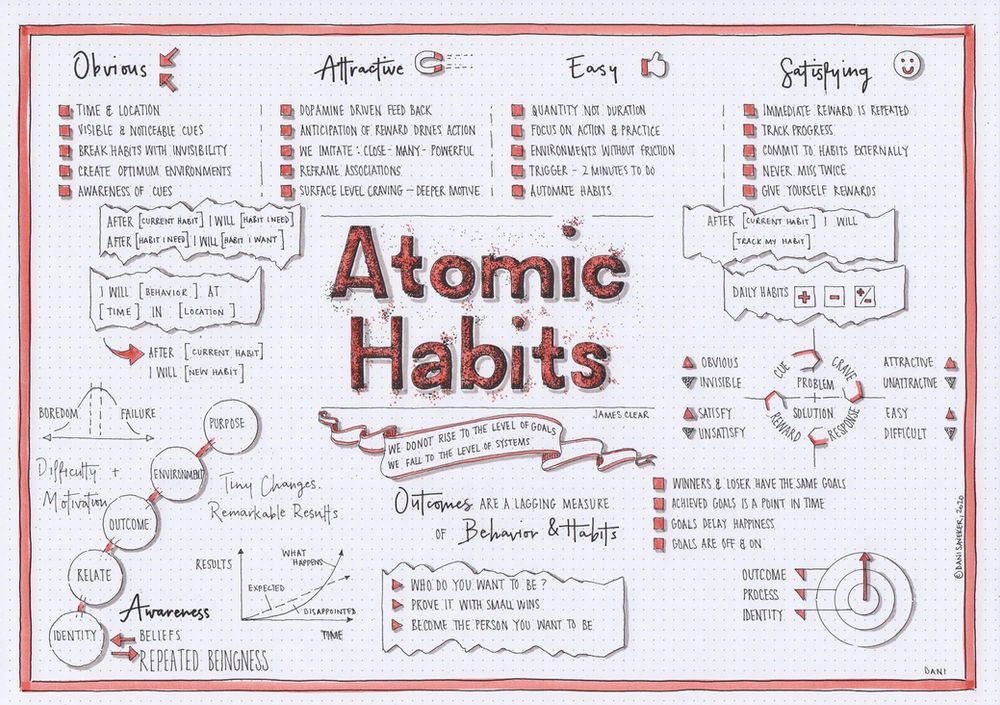Bad habits repeat themselves repeatedly, not because you don't want to change, but because you have the wrong system for change.
10 Lessons From (the book you still haven't read) Atomic Habits by James Clear:

Bad habits repeat themselves repeatedly, not because you don't want to change, but because you have the wrong system for change.
Here are 10 lessons from Atomic Habits by James Clear that can help you do that.
The easier it is to begin your new habit, the more likely you will stick with it.
If you want to start running, for instance, don't make a goal of running 5 miles a day.
Once that becomes easy, add more each time until you're up to your goal.
Cues are habits that trigger other habits.
For example, brushing your teeth is a cue that triggers the habit of flossing.
If you want to form a new habit, find an existing cue that you can use to trigger it.
When you have a craving for something, you're more likely to act on it.
So if you want to form a new habit, find a way to create a craving for it.
For example, if you want to eat healthily, ensure healthy snacks are visible and easily accessible.
The more satisfying your new habit is, the more likely you will stick with it.
If you're trying to eat healthily, make sure you're eating foods you enjoy and filling you up.
Goals give you something to strive for and help keep you motivated.
When setting a goal for your new habit, make sure it's specific, measurable, achievable, relevant, and time-bound (SMART).
If you want to make sure you stick with your new habit, set a deadline for yourself.
For example, if you want to start working out, make a goal of working out three times a week for six weeks.
When you have a plan, you're more likely to follow your habits.
So if you want to make sure you're sticking to your new habit, plan how you will do it.
The first plan you make likely won't work, so adjust it as needed.
Having someone to keep you accountable can be a great way to make sure you're sticking to your habits.
Find someone with a similar goal and check in with each other regularly to see how you're doing.
When you reach your goals, reward yourself!
This will help motivate you to keep going and make it more likely that you'll stick with your habits.
The reward can be big or small; it doesn't matter as long as it's unique.
Tracking your progress is a great way to stay motivated and on track with your habits.
Use a journal or app to track your new habit and how well you're doing.
This will help you see your progress and keep moving forward.
Developing good habits can be hard, but it's worth it.
These 10 lessons from Atomic Habits by James Clear can help you get started.
Plan
Set a goal
Find a cue
Start small
Make it easy
Set a deadline
Create a craving
Make it satisfying
Track your progress
Get an accountability partner
You can do it; just keep going!
If you got value from this, follow me
@aaronjgolub for more content.
You May Also Like
Stan Lee’s fictional superheroes lived in the real New York. Here’s where they lived, and why. https://t.co/oV1IGGN8R6

Stan Lee, who died Monday at 95, was born in Manhattan and graduated from DeWitt Clinton High School in the Bronx. His pulp-fiction heroes have come to define much of popular culture in the early 21st century.
Tying Marvel’s stable of pulp-fiction heroes to a real place — New York — served a counterbalance to the sometimes gravity-challenged action and the improbability of the stories. That was just what Stan Lee wanted. https://t.co/rDosqzpP8i

The New York universe hooked readers. And the artists drew what they were familiar with, which made the Marvel universe authentic-looking, down to the water towers atop many of the buildings. https://t.co/rDosqzpP8i

The Avengers Mansion was a Beaux-Arts palace. Fans know it as 890 Fifth Avenue. The Frick Collection, which now occupies the place, uses the address of the front door: 1 East 70th Street.

Stan Lee, who died Monday at 95, was born in Manhattan and graduated from DeWitt Clinton High School in the Bronx. His pulp-fiction heroes have come to define much of popular culture in the early 21st century.
Tying Marvel’s stable of pulp-fiction heroes to a real place — New York — served a counterbalance to the sometimes gravity-challenged action and the improbability of the stories. That was just what Stan Lee wanted. https://t.co/rDosqzpP8i

The New York universe hooked readers. And the artists drew what they were familiar with, which made the Marvel universe authentic-looking, down to the water towers atop many of the buildings. https://t.co/rDosqzpP8i

The Avengers Mansion was a Beaux-Arts palace. Fans know it as 890 Fifth Avenue. The Frick Collection, which now occupies the place, uses the address of the front door: 1 East 70th Street.










